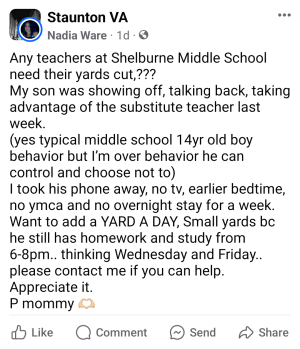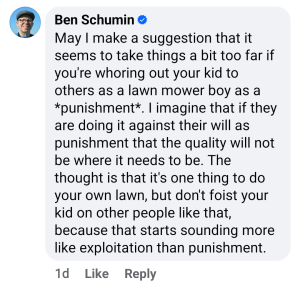Where does it go from punishment to exploitation?
8 minute read
May 1, 2024, 9:36 AM
Recently, this post by Nadia Ware came up on my news feed in a Staunton group that I’m in:
What you are seeing is a mother who was soliciting the group to find people who needed their lawns mowed so that she could make her son do it as a punishment for misbehavior in school. From what I could tell, she didn’t get any bites for actual lawns that needed mowing, but she did get herself an echo chamber, as most of the comments spoke quite favorably of the punishment.
I saw this post, and I couldn’t help but think that something felt wrong about this. I thought about it for a while, and then formulated a response, which apparently was the lone dissenting opinion on the matter:
I think that I made a pretty good point here, suggesting that this crosses a line between punishment and exploitation.
The responses that I got were more or less what I expected. Ware responded fairly simply:
That was an eyeroll emoji followed by “byyyyyye” (six Ys right there). How mature. Clearly, she wasn’t having it from me, and couldn’t stand the thought of someone’s challenging the idea that her punishment is better than beef stew. It was no surprise that my response fell on deaf ears. But most community groups are like that, with very simple-minded thinking and responses based largely on emotion rather than reason. The Montgomery Village group that I’m in is the exact same way.
Then I also got this response from someone who went by the name “Francis John”:
Francis John had nothing to contribute to the discussion other than an ad hominem attack. Too many parents have this toxic mindset that if you aren’t a parent, you are not allowed to have opinions about anything related to parenting, i.e. everything that you say is automatically wrong. The way that I see it, I may not have children of my own, and most likely never will, but that doesn’t mean that I’m not allowed to have an opinion on the subject and to express it. If you don’t like my opinion, you may respectfully disagree with it, but don’t just categorically dismiss someone with an ad hominem attack and tell them to get lost because they don’t have kids of their own. That’s rude.
But getting down to the substance of the matter, I take two issues with what I observed. First of all, she just broadcasted to the world how much of a little hellion her son was. How humiliating for the child. I’m sure that many late Gen-Xers and early Millennials, i.e. my age group, are eternally grateful that our parents did not have the Internet, and particularly social media, to tell the world exactly how much we misbehaved back when we were kids. This woman totally outed her kid to the world for every single misdeed that he was accused of doing. I did not need to know all of that. Additionally, how does that reflect on Ware? After all, her child had to learn it from somewhere, and parents teach their children far more than they could ever imagine, both intentionally and unintentionally, and teaching both good things and bad things. Considering Ware’s flippant response to my criticism, with the eyeroll emoji and “byyyyyye” remark, it makes me start to wonder if her son had unintentionally learned that kind of behavior from her. And in that case, it would be a bit hypocritical for her to broadcast him as being such a little rotter, because her behavior helps explain his. My parents didn’t broadcast to everyone whenever I misbehaved when I was growing up. That sort of thing was handled internally, and as far as anyone else knew at the time, I was the perfect child (yes, I am exaggerating just a little, but you get the point). Ware, on the other hand, is trashing her child’s reputation in a public forum, which doesn’t do her child any favors. It’s bad enough when teachers gossip to each other about students and cause a student’s reputation to precede them, but I feel like Ware is helping this negativity happen, which has the potential to make her son’s life more difficult as future teachers judge him as a troublemaker before they ever meet him, and treat him differently than they might otherwise do if they had gone in clean.
Then there’s the idea that the punishment that Ware was attempting to hand down to her child seems to cross a line somewhere as far as the extent of the punishment. Most of the punishment, i.e. no phone, no television, a change in bedtime, no YMCA, and no overnight stays, I have no issue with, since they’re all things that, for the most part, affect only the child. I admit that throwing all of these various sanctions at the kid at once, i.e. throwing the book at them, seems a bit out-sized, but I also don’t know if there is more history here that we were not made aware of, i.e. we don’t know if this was a one-off incident, or if this is just the latest in a long string of similar misdeeds on the part of the child. But each of those things individually seems reasonable enough.
Where I take issue is with the lawn mowing. It seems like Ware is attempting to assign community service via the lawn mowing on top of everything else, but the way that she is going about it seems problematic. It seems like she’s functioning almost as a pimp, making appointments for the child to toil away for strangers for no compensation. To me, this crosses a line because now she’s just offering the kid up as free labor to the public, allegedly to punish him for his misdeeds. The way I see it, it’s one thing to assign the mowing of your own lawn as a punishment. It’s an entirely different matter to offer your child up to third parties for the same. It is also an entirely different matter that the child is being offered up to individuals rather than to a nonprofit community organization or the like. Offering up your son’s labor to private individuals without his consent seems like exploitation, essentially taking advantage of him at a vulnerable time to score points with the neighbors or the like, for services that ought to be paid. This also dovetails with point #1, in that it takes the punishment outside of the household. Every single one of Ware’s “customers” knows that the only reason that the person mowing their lawn is doing this is because he was a little rapscallion, and is being forced to do it against his will. No maintaining the pretense that as far as anyone else knows, their son is a perfect little angel. So now everyone else knows that if they see the kid out mowing lawns, it’s because he had misbehaved. And this all ultimately reflects back on the parents, i.e. because we see Ware’s son out mowing lawns, does that mean that Nadia Ware is a bad parent who can’t control her son, or sets a very poor example for her child to the point that this is all that he knows, and thus why she has to throw the book at him when he misbehaves? Clearly, no one thought about it from that angle.
One also has to question the quality of work that one will get from someone who is not doing this willingly, but instead is doing it because they were sentenced to hard labor by their mother. Getting it over with as quickly as possible comes to my mind, i.e. just knock it out with no regard to how good the job is just to mark it off as done. It also makes one question whether one would even want someone cutting their lawn who is doing it against their will, because if it’s done poorly and you have to go out and fix it afterward, the entire effort ends up being a waste of everyone’s time just to allow a mother to exact revenge on her child for misbehaving, on top of all of the other sanctions that she had already handed down.
But I would argue that there are better ways to do things if one wants to add a community service component to a punishment. Community service, in and of itself, is not a bad thing. It provides a benefit to the greater community, and also provides a wholesome lesson to the offender. Holding the lawn mowing constant for a moment, if one is to do that, it needs to be entered into willingly by the child. In other words, if you’re going to offer up the child’s services to third parties, the child needs to be fully on board with it. In the case of lawn mowing, make it where the child wants to get on board with it. Mowing lawns should, for instance, remove certain aspects of the punishment, or shorten its duration. Mow a lawn and get your YMCA back. Mow a lawn and get your TV back. Mow a lawn and get your normal bedtime reinstated (though I really don’t like the idea of using sleep as a punishment in the first place). You get the point. Or, alternately, every lawn mowed knocks a day off of the punishment. I would more than willingly mow the entire neighborhood in one day and do a five-star job at it, too, if it meant erasing sanctions and getting my normal life back immediately. Lesson learned, debt to society repaid, and now let’s move on.
Then, of course, what if we don’t have lawn mowing as community service? What if we actually do some real community service instead of mowing people’s lawns? The same points hold from earlier, in that community service can be used in addition to the other sanctions, or can be used as a way to reduce the other sanctions. It also seems less obvious that the kid is doing this as punishment, and thus limits the damage to the kid’s reputation. It might even make the kid look good in the eyes of others by his participating in community service activities. After all, in that situation, for all anyone else knows, the kid is doing it out of a sense of duty, and no one else needs to know that he is fulfilling a punishment for misbehavior. That is, unless somebody blabs about it otherwise. I would not put it past Ware to be so petty, and considering that she deliberately let it be known to the world that her son can’t behave himself in school as part of his punishment, i.e. broadcasting all of her shortcomings as a parent for everyone to see. But seriously, the Valley Mission, the Blue Ridge Area Food Bank, or the local Habitat for Humanity would likely welcome another set of hands to help fulfill their respective missions, and it might just give the kid a new perspective on things. It’s beneficial for the community, and also educational for the kid.
I guess what I’m saying by all this is, keep the punishments inside of the family, because all I see is a lot of bad parenting. Don’t offer up your child’s services to third parties without their consent. Don’t sully your child’s reputation by broadcasting their misdeeds on Facebook for all to see. Hold your child up to the world as a good person, even if they’ve made a few mistakes along the way. Letting everyone know how horrible the child has been and exploiting them for free labor for the community is not helping anyone.
Categories: Social media, Staunton














Leave a Reply